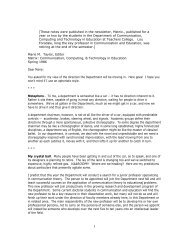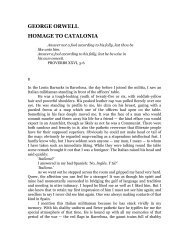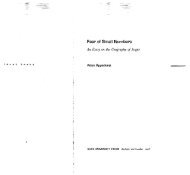THE REPUBLIC OF PLATO - Studyplace
THE REPUBLIC OF PLATO - Studyplace
THE REPUBLIC OF PLATO - Studyplace
You also want an ePaper? Increase the reach of your titles
YUMPU automatically turns print PDFs into web optimized ePapers that Google loves.
18 CHAPTER III [I. 338<br />
you are wrong to call me ungrateful. I give in return all I canpraise;<br />
for I have no money. And how ready I am to applaud any<br />
idea that seems to me sound, you will see in a moment, when you<br />
have stated your own; for I am sure that will be sound.<br />
Listen then, Thrasymachus began. What I say is that 'just' or<br />
'right' means nothing but what is to the interest of the stronger<br />
party. Well, where is your applause You don't mean to give it me.<br />
I will, as soon as I understand, I said. I don't see yet what you<br />
mean by right being the interest of the stronger party. For instance,<br />
Polydamas, the athlete, is stronger than we are, and it is to<br />
his interest to eat beef for the sake of his muscles; but surely you<br />
don't mean that the same diet would be good for weaker men and<br />
therefore be right for us<br />
You are trying to be funny, Socrates. It's a low trick to take my<br />
words in the sense you think will be most damaging.<br />
No, no, I protested; but you must explain.<br />
Don't you know, then, that a state may be ruled by a despot, or<br />
a democracy, or an aristocracy<br />
Of course.<br />
And that the ruling element is always the strongest<br />
Yes.<br />
Well then, in every case the laws are made by the ruling party<br />
in its own interest; a democracy makes democratic laws, a despot<br />
autocratic ones, and so on. By making these laws they define as<br />
'right' for their subjects whatever is for their own interest, and<br />
they call anyone who breaks them a 'wrongdoer' and punish him<br />
accordingly. That is what I mean: in all states alike 'right' has the<br />
same meaning, namely what is for the interest of the party established<br />
in power, and that is the strongest. So the sound conclusion<br />
is that what is 'right' is the same everywhere: the interest of the<br />
stronger party.<br />
Now I see what you mean, said I; whether it is true or not, I<br />
must try to make out. When you define right in terms of interest,<br />
you are yourself giving one of those answers you forbade to me;<br />
though, to be sure, you add 'to the stronger party"<br />
An insignificant addition, perhapsI









